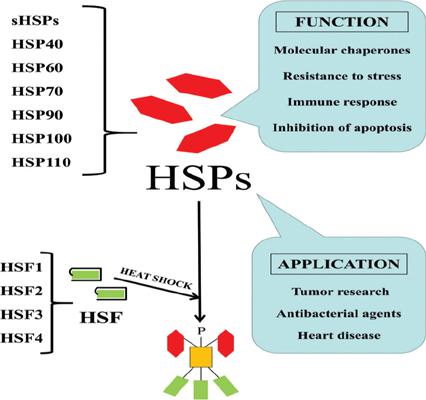Current Protein & Peptide Science ( IF 1.9 ) Pub Date : 2020-07-31 , DOI: 10.2174/1389203720666191111113726 Qiang Shan 1 , Fengtao Ma 1 , Jingya Wei 1 , Hongyang Li 1 , Hui Ma 2 , Peng Sun 1

|
Heat shock proteins (HSPs) are molecular chaperones involved in a variety of life activities. HSPs function in the refolding of misfolded proteins, thereby contributing to the maintenance of cellular homeostasis. Heat shock factor (HSF) is activated in response to environmental stresses and binds to heat shock elements (HSEs), promoting HSP translation and thus the production of high levels of HSPs to prevent damage to the organism. Here, we summarize the role of molecular chaperones as anti-heat stress molecules and their involvement in immune responses and the modulation of apoptosis. In addition, we review the potential application of HSPs to cancer therapy, general medicine, and the treatment of heart disease.
中文翻译:

热激蛋白的生理功能。
热休克蛋白(HSP)是参与各种生活活动的分子伴侣。HSPs在错误折叠的蛋白质的重新折叠中起作用,从而有助于维持细胞稳态。热激因子(HSF)响应于环境压力而激活,并与热激元素(HSE)结合,从而促进HSP翻译,从而促进了高水平HSP的产生,从而防止了对生物的破坏。在这里,我们总结了分子伴侣作为抗热应激分子的作用及其参与免疫应答和细胞凋亡的调节。此外,我们回顾了HSP在癌症治疗,普通医学和心脏病治疗中的潜在应用。











































 京公网安备 11010802027423号
京公网安备 11010802027423号